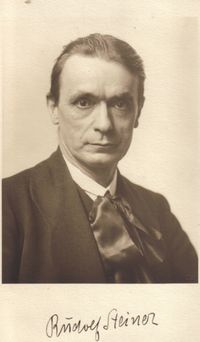Anthroposophy

Anthroposophy (from Greek ἄνθρωπος ánthropos 'man' and σοφία sophίa 'wisdom') was founded by Rudolf Steiner (1861-1925) as a "path of knowledge, which wants to lead the spiritual in the human being to the spiritual in the universe"[1]. In this sense it wants to expand the "consciousness of his humanity" [2]. Starting from a deepened knowledge of man based on spiritual experience, anthroposophy opens a new, fully conscious thought-clear and scientifically exact access to the objective spiritual world. As a modern Spiritual science, it orients itself methodically to natural science and complements and expands its findings, corresponding to the demands of our time.
„By anthroposophy I understand a scientific investigation of the spiritual world which recognizes the one-sidedness of a mere knowledge of nature as well as that of ordinary mysticism, and which, before it makes the attempt to penetrate into the supersensible world, first develops in the discerning soul those forces which are not yet active in ordinary consciousness and in ordinary science and which make such a penetration possible.“
Introduction
Anthroposophy sees itself as a method of individual development of consciousness. Its basis is an epistemologically founded concept of human individuality[3] and furthermore a "trained Goetheanism".[4]] It contains contents of Rosicrucianism, insofar as they have been elaborated by Rudolf Steiner[5], a detailed presentation of the stages of world development as well as a conception of re-embodiment and destiny, which differs fundamentally from many Eastern approaches.
References
- ↑ GA 26, p. 14
- ↑ GA 257, p. 76
- ↑ Rudolf Steiner: Grundlinien einer Erkenntnistheorie der Goetheschen Weltanschauung. 8. Auflage. Rudolf Steiner Verlag, Dornach 2002
- ↑ Rudolf Steiner: Innere Entwicklungsimpulse der Menschheit - Goethe und die Krisis des neunzehnten Jahrhunderts. Rudolf Steiner Verlag, Dornach, 1984, p. 136
- ↑ Rudolf Steiner: Die Theosophie des Rosenkreuzers, GA 99 (1985)
